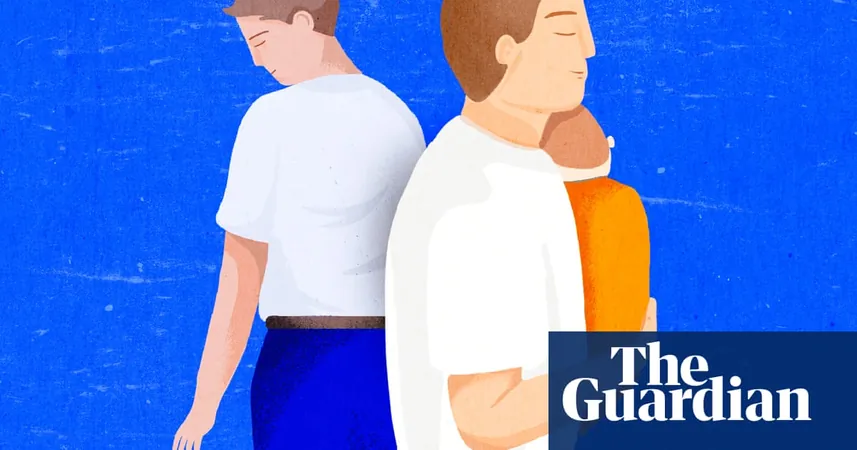
‘Invisible Dads’: How Society Fails New Fathers When They Need Help Most
2025-06-01
Author: Chun
Becoming a father is often hailed as a joyful milestone, but for many, the journey is anything but smooth. For Dean Rogut, the arrival of his son Max marked the start of a harrowing experience that would challenge not only his mental health but also his sense of identity.
The Silent Struggles of New Fathers
Dean’s wife went on bed rest at just 12 weeks into her pregnancy. By 24 weeks, they welcomed their son, Max, who spent 121 days in the NICU. Rogut found himself in a ‘supporting role,’ concentrating on his wife and their child while undergoing a profound sense of isolation. "I was in survival mode," he recalls, highlighting how the focus of concern remained predominantly on mothers.
Neglected Mental Health
Although it is widely recognized that up to one in five women experience perinatal anxiety or depression, fathers are left in the shadows, receiving little to no mental health support. Research shows that approximately one in ten new fathers, like Rogut, grapple with severe mental health issues during this critical period. Lack of recognition leaves many fathers feeling invisible and unsupported.
According to experts, this oversight has far-reaching consequences—not just for fathers, but for their partners and children as well. Associate Professor Jacqui Macdonald emphasizes the absence of a supportive community for fathers, stating, "The language often centers around fathers as support for mothers, with little acknowledgment of their own needs."
A Culture of Isolation
The disconnect isn't unique to Australia. In the UK, Dr. Sharin Baldwin's review indicated that many men feel excluded during the perinatal period, struggling with identity shifts, work-life balance, and financial stress. Macdonald notes, "Men often suffer in silence during one of the most significant transitions of their lives."
Breaking the Cycle
Addressing the mental health needs of fathers is critical, as unhealthy dynamics can affect family cohesion. If one member of the family struggles, the impact ripples through the entire unit. "If we can support fathers, we enable them to care better for their partner and child," Macdonald asserts.
Redefining Fatherhood
Societal expectations of fatherhood have evolved over the last few decades, aiming for a more equitable family structure. Yet, many men still find themselves unsure of their roles, caught between traditional norms and modern parenting ideals. "While couples may desire shared responsibilities, the system fundamentally communicates to fathers that their involvement is limited," Fletcher points out.
Solutions on the Horizon
Experts like Fletcher and Macdonald advocate for a cultural shift that includes systematic screening for new fathers. Measures taken in the UK to identify mental health challenges in fathers when their partners face difficulties are seen as a step forward but highlight the need for a comprehensive support structure.
Innovative solutions, such as mood-tracking apps designed specifically for fathers, have shown promise in helping them manage stress and improve relationships. Support services like SMS4dads aim to reduce feelings of isolation by fostering community.
The Journey Ahead
Now a teenager, Max’s existence is a daily reminder for Dean Rogut of the struggles he underwent as a new father. Reflecting on what could have been different, he muses, "If I had been recognized as someone needing help, perhaps I wouldn’t have faced that crisis." As awareness grows around paternal mental health, there is hope for more inclusive frameworks that genuinely consider the well-being of fathers and their families.
The time is now for society to re-evaluate how we support new fathers, recognizing that they are integral to the family unit. By addressing their mental health, we can foster healthier families, creating a nurturing environment for everyone involved.


 Brasil (PT)
Brasil (PT)
 Canada (EN)
Canada (EN)
 Chile (ES)
Chile (ES)
 Česko (CS)
Česko (CS)
 대한민국 (KO)
대한민국 (KO)
 España (ES)
España (ES)
 France (FR)
France (FR)
 Hong Kong (EN)
Hong Kong (EN)
 Italia (IT)
Italia (IT)
 日本 (JA)
日本 (JA)
 Magyarország (HU)
Magyarország (HU)
 Norge (NO)
Norge (NO)
 Polska (PL)
Polska (PL)
 Schweiz (DE)
Schweiz (DE)
 Singapore (EN)
Singapore (EN)
 Sverige (SV)
Sverige (SV)
 Suomi (FI)
Suomi (FI)
 Türkiye (TR)
Türkiye (TR)
 الإمارات العربية المتحدة (AR)
الإمارات العربية المتحدة (AR)